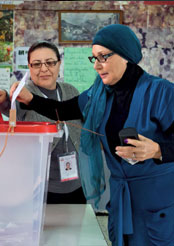RESEARCH WITH IMPACT
Exploring Governance in Muslim Contexts
 The Institute for the Study of Muslim Civilisations brought together scholars from 16 countries and five continents to assist with the development of its governance project.
The Institute for the Study of Muslim Civilisations brought together scholars from 16 countries and five continents to assist with the development of its governance project.
How can Muslim societies develop political systems that promote public welfare, achieve popular legitimacy and recognize minority rights in a time marked by heated debates over tradition, religion and modernity?
AKU’s Institute for the Study of Muslim Civilisations in London is tackling such questions through a new research project dubbed Governance for the Public Good in Muslim Contexts. The project aims to stimulate governance-related research and discussion among academics, non-governmental organizations, policymakers, the media and publics within and beyond the Muslim world.
“We want to clarify crucial concepts and issues that are widely discussed in the Muslim world but often ill-defined or understood in radically different ways,” said project leader Abdou Filali-Ansary. “Clarity may seem a small thing, but it can be of tremendous value.”
In 2014, the project organized seminars on constitutional change in the Arab world; multiculturalism and minority rights; and notions of an “Islamic alternative” to the modern state. In 2015–2016, seminars are focusing on gender and governance. Still to come is a two-volume Companion to Governance in Muslim Contexts and an online database of governance research and initiatives focused on the Muslim world.
ISMC’s approach reflects input gathered during workshops that brought together scholars from 16 countries and five continents, ranging from the president of Tunisia’s constitutional reform commission to noted Canadian political philosopher Will Kymlicka. More recently, the project organized an interdisciplinary workshop in Morocco on the governance of water resources. In addition, a number of books recently or soon to be published by ISMC through its partnerships with various academic presses speak to the Governance project’s theme. These include an English translation of Baudouin Dupret’s Sharia: The Multiple Realities of Islamic Law, a short paperback aimed at a wide audience, extracts from which Filali-Ansary hopes can be published throughout the Muslim world.
“It’s very important that our reach goes beyond academic communities to leaders and the general public,” he said.

